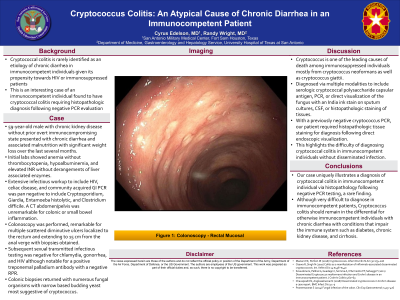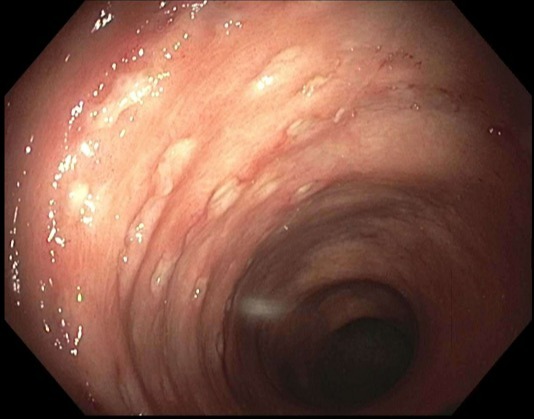Back


Poster Session E - Tuesday Afternoon
Category: Colon
E0157 - Cryptococcus Colitis: An Atypical Cause of Chronic Diarrhea in an Immunocompetent Patient
Tuesday, October 25, 2022
3:00 PM – 5:00 PM ET
Location: Crown Ballroom

Has Audio

Cyrus V. Edelson
Brooke Army Medical Center
San Antonio, TX
Presenting Author(s)
Cyrus V. Edelson, 1, Randy Wright, MD2
1Brooke Army Medical Center, San Antonio, TX; 2UT Health San Antonio, San Antonio, TX
Introduction: Cryptococcal colitis is rarely identified as an etiology of chronic diarrhea in immunocompetent individuals given its propensity towards HIV or immunosuppressed patients. We present an interesting case of an immunocompetent individual found to have cryptococcal colitis requiring histopathologic diagnosis following negative PCR evaluation.
Case Description/Methods: A 59-year-old male with chronic kidney disease with no prior diagnosis of overt immunocompromising state who presented with chronic diarrhea and associated malnutrition with significant weight loss over the last several months. Initial laboratory evaluation showed anemia without thrombocytopenia, hypoalbuminemia, and elevated INR without derangements of liver associated enzymes. Extensive infectious workup to include HIV, celiac disease, and community acquired GI PCR was pan negative to include Cryptosporidium, Giardia, Entamoeba histolytic, and Clostridium difficile. A CT abdomen/pelvis was unremarkable for colonic or small bowel inflammation. Colonoscopy was performed, remarkable for multiple scattered diminutive ulcers localized to the rectum and extending to 15 cm from the anal verge with biopsies obtained. Subsequent sexual transmitted infectious testing was negative for chlamydia, gonorrhea, and HIV although notable for a positive treponemal palladium antibody with a negative RPR. Colonic biopsies returned with numerous fungal organisms with narrow based budding yeast most suggestive of cryptococcus.
Discussion: Cryptococcus is one of the leading causes of death among immunosuppressed individuals mostly from cryptococcus neoformans as well as cryptococcus giattii. Cryptococcus can be diagnosed with multiple modalities to include serologic cryptococcal polysaccharide capsular antigen, PCR, or direct visualization of the fungus with an India ink stain on sputum cultures, CSF, or histopathologic staining of tissues. With a previously negative cryptococcus PCR, our patient required histopathologic tissue staining for diagnosis following direct endoscopic visualization. This highlights the difficulty of diagnosing cryptococcal colitis in immunocompetent individuals without disseminated infection. Cryptococcus colitis should remain in the differential for otherwise immunocompetent individuals with chronic diarrhea with conditions that impair the immune system such as diabetes, chronic kidney disease, and cirrhosis.

Disclosures:
Cyrus V. Edelson, 1, Randy Wright, MD2. E0157 - Cryptococcus Colitis: An Atypical Cause of Chronic Diarrhea in an Immunocompetent Patient, ACG 2022 Annual Scientific Meeting Abstracts. Charlotte, NC: American College of Gastroenterology.
1Brooke Army Medical Center, San Antonio, TX; 2UT Health San Antonio, San Antonio, TX
Introduction: Cryptococcal colitis is rarely identified as an etiology of chronic diarrhea in immunocompetent individuals given its propensity towards HIV or immunosuppressed patients. We present an interesting case of an immunocompetent individual found to have cryptococcal colitis requiring histopathologic diagnosis following negative PCR evaluation.
Case Description/Methods: A 59-year-old male with chronic kidney disease with no prior diagnosis of overt immunocompromising state who presented with chronic diarrhea and associated malnutrition with significant weight loss over the last several months. Initial laboratory evaluation showed anemia without thrombocytopenia, hypoalbuminemia, and elevated INR without derangements of liver associated enzymes. Extensive infectious workup to include HIV, celiac disease, and community acquired GI PCR was pan negative to include Cryptosporidium, Giardia, Entamoeba histolytic, and Clostridium difficile. A CT abdomen/pelvis was unremarkable for colonic or small bowel inflammation. Colonoscopy was performed, remarkable for multiple scattered diminutive ulcers localized to the rectum and extending to 15 cm from the anal verge with biopsies obtained. Subsequent sexual transmitted infectious testing was negative for chlamydia, gonorrhea, and HIV although notable for a positive treponemal palladium antibody with a negative RPR. Colonic biopsies returned with numerous fungal organisms with narrow based budding yeast most suggestive of cryptococcus.
Discussion: Cryptococcus is one of the leading causes of death among immunosuppressed individuals mostly from cryptococcus neoformans as well as cryptococcus giattii. Cryptococcus can be diagnosed with multiple modalities to include serologic cryptococcal polysaccharide capsular antigen, PCR, or direct visualization of the fungus with an India ink stain on sputum cultures, CSF, or histopathologic staining of tissues. With a previously negative cryptococcus PCR, our patient required histopathologic tissue staining for diagnosis following direct endoscopic visualization. This highlights the difficulty of diagnosing cryptococcal colitis in immunocompetent individuals without disseminated infection. Cryptococcus colitis should remain in the differential for otherwise immunocompetent individuals with chronic diarrhea with conditions that impair the immune system such as diabetes, chronic kidney disease, and cirrhosis.

Figure: Rectal ulcerations
Disclosures:
Cyrus Edelson indicated no relevant financial relationships.
Randy Wright indicated no relevant financial relationships.
Cyrus V. Edelson, 1, Randy Wright, MD2. E0157 - Cryptococcus Colitis: An Atypical Cause of Chronic Diarrhea in an Immunocompetent Patient, ACG 2022 Annual Scientific Meeting Abstracts. Charlotte, NC: American College of Gastroenterology.
